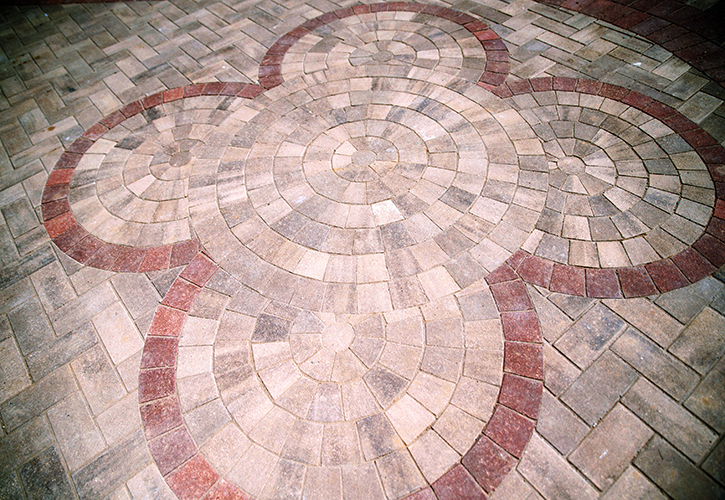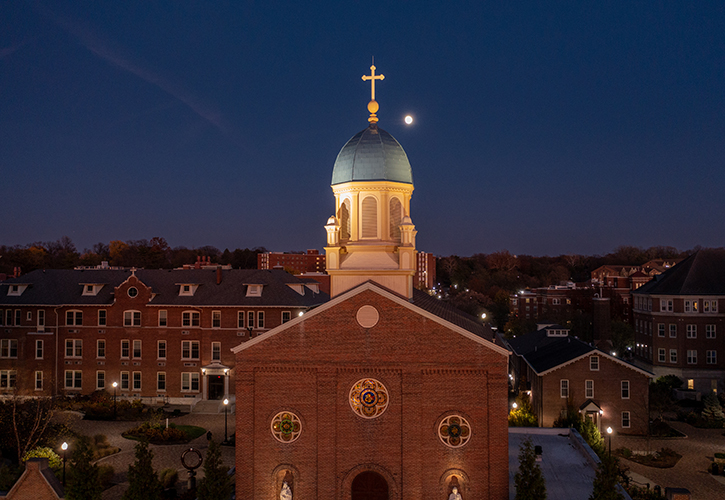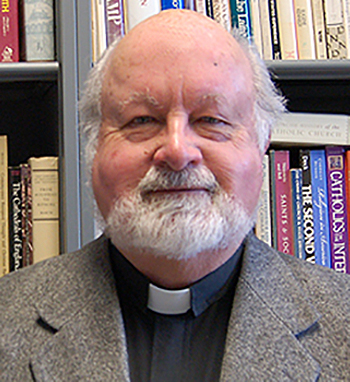Gudorf Chair in Catholic Intellectual Traditions
Fr. Jack McGrath, S.M. Award for Research in Catholic Intellectual Traditions
The McGrath Award recognizes students whose research in a CAP course demonstrates rigorous, deep, and creative engagement with thinkers, texts and/or themes associated with Catholic Intellectual Traditions.
Awardees are honored with a $750 stipend at the annual Catholic Intellectual Tradition Symposium early in the spring semester, where they will offer a presentation of their work.
The submission deadline for the 2025 Fr. Jack McGrath, S.M. Award for Research in Catholic Intellectual Traditions is Dec. 18, 2024. Faculty letters of support will be due Jan. 3, 2025. Projects completed during Spring 2024, Summer 2024 or Fall 2024 are eligible for the 2025 award.
Students interested in applying can do so at this internal link (Porches log-in).
We expect to make three awards in both the First-year/Sophomore and Junior/Senior categories. Winners receive a $750 scholarship, along with the opportunity to present their research at the 2025 Catholic Intellectual Traditions Symposium.
Congratulations to the 2024 McGrath Award Winners in the Junior/Senior and First-Year/Sophomore Divisions. Each awardee will present research at the 2024 Catholic Intellectual Tradition Symposium (Feb. 5–6) in KU’s Torch Lounge. They are:
2024 Junior and Senior Awards
 A Philosophy major with a minor in Economics, he wrote his award-winning research, “Visual Rhetoric of the Persecuted Christian Right,” for ENG 364 with Prof. Susan Trollinger.
A Philosophy major with a minor in Economics, he wrote his award-winning research, “Visual Rhetoric of the Persecuted Christian Right,” for ENG 364 with Prof. Susan Trollinger.
Presentation: 4:30 p.m., Tuesday, Feb. 6, 2024
 A Religious Studies and Theology major, he wrote his award-winning research, “The Arks of Noah and Utnapishtim,” for REL 310 with Prof. Esther Brownsmith.
A Religious Studies and Theology major, he wrote his award-winning research, “The Arks of Noah and Utnapishtim,” for REL 310 with Prof. Esther Brownsmith.
Presentation: 4 p.m., Tuesday, Feb. 6, 2024
 A Communication and English major, she wrote her award-winning research, “Excavating the Sunken Places: Analyzing Jordan Peele’s Get Out as Apocalyptic Rhetoric Comparable to Greek Hades,” for CMM/REL 359 with Profs. Meghan Henning and Robert Joseph.
A Communication and English major, she wrote her award-winning research, “Excavating the Sunken Places: Analyzing Jordan Peele’s Get Out as Apocalyptic Rhetoric Comparable to Greek Hades,” for CMM/REL 359 with Profs. Meghan Henning and Robert Joseph.
Presentation: 5 p.m., Monday, Feb. 5, 2024
2024 First-year and Sophomore Awards
 An English major who wrote her award-winning research, “‘The Truth Only Dies When True Stories Are Untold’: The Story of Reconstruction in New Orleans,” for ASI 120 with Prof. David Darrow.
An English major who wrote her award-winning research, “‘The Truth Only Dies When True Stories Are Untold’: The Story of Reconstruction in New Orleans,” for ASI 120 with Prof. David Darrow.
Presentation: 5 p.m., Tuesday, Feb. 6, 2024
 A Communication and Religious Studies and Theology major with a minor in Music, she wrote her award-winning research, “The Gift of the Holy Spirit,” for REL 443 with Prof. Timothy Gabrielli.
A Communication and Religious Studies and Theology major with a minor in Music, she wrote her award-winning research, “The Gift of the Holy Spirit,” for REL 443 with Prof. Timothy Gabrielli.
Presentation: 3:30 p.m., Tuesday, Feb. 6, 2024
 A Mechanical Engineering Technology major, he wrote his award-winning research, “‘When Would the Platonist Books Have Taught Me That?’ St. Augustine’s Dance with Neo-Platonic Reasoning,” for ASI 110 with Prof. Anthony Smith.
A Mechanical Engineering Technology major, he wrote his award-winning research, “‘When Would the Platonist Books Have Taught Me That?’ St. Augustine’s Dance with Neo-Platonic Reasoning,” for ASI 110 with Prof. Anthony Smith.
Presentation: 4 p.m., Monday, Feb. 5, 2024

“CIT includes this interdisciplinary idea of faith seeking understanding, understanding seeking faith.”

“The Catholic Intellectual Tradition is really focused on critical thinking and making connections across different boundaries."

Sponsored by the Gudorf Chair in Catholic Intellectual Traditions, the award is named in honor of UD alumnus Fr. Jack McGrath (1935–2015), a dedicated teacher, who celebrated and embodied Marianist education in the Catholic Intellectual Tradition.
Fr. McGrath held degrees in philosophy, history and theology. Across his illustrious career, which spanned nearly 60 years, Fr. McGrath taught high schoolers, undergraduates and graduate students in a range of disciplines, including math, American history and theology. Among many other roles in the Society of Mary, he served as a faculty member at UD beginning in 1987, where he founded the Forum on the Catholic Intellectual Tradition Today.
Award Information
In his book, Reading the Signs of the Times, Speaking to a Changing World (2003), Fr. McGrath narrates Catholic tradition as a dynamic interplay of reflection and practice, centered on God revealed in Christ, always in dialogue with broader developments in scholarship and society. UD carries on that reflective inquiry into our human nature, our world, our past, our communities, our successes and our failures, seeking the true and beautiful, so that we might serve the common good. That inquiry demands a diversity of persons and approaches. Truth is multifaceted and we often encounter it in the voices of those who have historically been marginalized. David Tracy reminds us that “The ideal is of course the whole … the whole not as a totality but as infinite, dynamic, open.” How do UD students approach the whole of truth?
At the University of Dayton, we “pursue understanding as the path to wisdom and embrace both faith and reason.” Engagement with the Catholic Intellectual Tradition (CIT) is central to the aims and purposes of UD’s Common Academic Program (CAP). Flowing out of the Catholic and Marianist mission and identity of the university, students in Humanities Commons courses “engage central concepts of Catholic Intellectual Tradition as they contribute to humanistic inquiry and reflection in the relevant academic discipline.”
As they progress through CAP, students’ engagement with CIT also progresses. Crossing Boundaries courses “strengthen the Catholic intellectual tradition in significant ways. This tradition in Catholic and Marianist higher education emphasizes the centrality of theology and philosophy, the importance of linking faith and reason, the integration of knowledge, and the application of that knowledge to personal and social situations in the world today.” Integrative courses emphasize CIT’s recognition that truth transcends any single discipline’s methods. Students ideally glimpse what physicist Max Planck called “the intimate union between the beautiful, the true and the real.” Courses in Advanced Historical, Philosophical, and Religious Studies “draw upon the resources of the Catholic intellectual tradition as [students] consider how to lead wise and ethical lives of leadership and service.”
The McGrath Award encourages and recognizes outstanding student research related to the themes and resources of CIT in the context of CAP coursework. Students are urged to think about CIT broadly, with Mary Ellen O’Donnell, as "a dynamic, living and rich heritage that persists and evolves." Research is most welcome that engages sources of CIT—classical and/or oft-overlooked—in conjunction with the themes of vocation, faith and reason, environmental and social justice, beauty, human rights, the nature of work, the common good, etc. A starting point for thinking about CIT is an appendix to the 2012 UD document Common Themes in the Mission and Identity of the University of Dayton, “The Catholic Intellectual Tradition and the Mission of the University: A Continuing Conversation.”
- Intellectual rigor and creativity of research
- Depth of engagement with topics, sources, and/or thinkers in the Catholic Intellectual Tradition
- Financial need of applicant (the first two criteria are paramount in the committee’s deliberations; the consideration of financial need is a subsequent one)
All submissions will be evaluated by the McGrath Award Committee convened by the Gudorf Chair in Catholic Intellectual Traditions. Final determination of awards will be made by the Gudorf Chair in consultation with the committee and the Office of Admission and Financial Aid.
